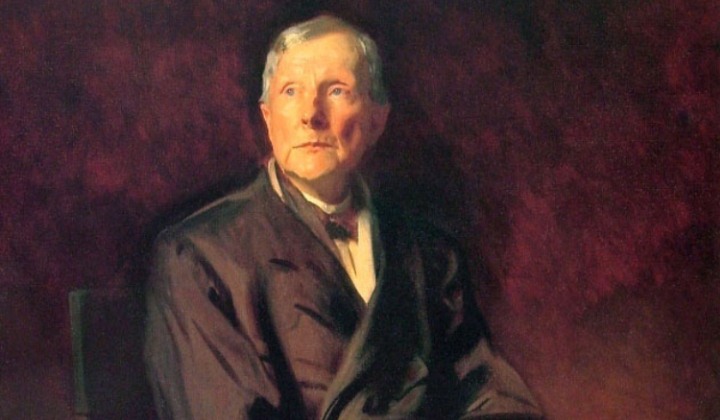
John Rockefeller, Sr (1839-1937), the boss of Standard Oil
by Mary Maxwell, currently a candidate for US Senate
I will argue in this series of articles that the US federal government should get out of health care. I claim that the following offices are harmful and we would be better off without them: The National Institutes of Health (NIH), the Centers for Disease Control and Prevention (CDC), and the part of the Food and Drug Administration (FDA) that decides which medical treatments are approved for manufacture.
I also believe the following private organizations are generally harmful: The American Medical Association, the American Cancer Society, and Blue Cross Insurance Co. I made such claims in my 2013 book Consider the Lilies: A Review of 18 Cures for Cancer and Their Legal Status. The current “health care debate” has occasioned a restatement of these ideas.
The headline in USA Today on June 27, 2017 was: “Rift Over Health Care Engulfs GOP”. That ‘rift’ is only a tiny portion of what people should be thinking about. Media’s preference for presenting Medicine as a partisan matter (or in this case, a factional matter) is typical; it takes our eyes off of what is really happening.
I have noticed during my campaign in Alabama that the subject of health legislation gets mixed up with an essential question about the generosity of government: Should public funds be used to assist the poor and the disabled? Media also talks about human naughtiness, as in “Let’s be alert for ways that people (either doctors or patients) can take unfair advantage.”
Those two subjects — generosity to the poor, and advantage taking – deserve discussion, but not mixed with the subject of health care. Today’s medical practice occurs in a cultural context that citizens should be looking at for its own sake, unrelated to Obama Care or Rand Paul care, or anything else. Boy oh boy does it need a re-look!
The Rockefellers’ Control of Medicine
As shown in my Consider the Lilies book, John D Rockefeller, Sr, had a big hand in the direction American medicine would take. This was around 1913. Indeed, he had ambitions in many areas, and even founded the World Council of Churches – imagine that.
The philanthropyroundtable.org website says:
“After starting life in humble circumstances, John Rockefeller came to dominate the burgeoning petroleum industry by the time he was 40 years old. He became the richest man of his time….
A natural businessman with a strong moral sense [Don’t you believe it!], … he dedicated unprecedented resources to charity. Within his lifetime, Rockefeller helped launch the field of biomedical research, funding scientific investigations that resulted in vaccines for things like meningitis and yellow fever …. He revolutionized medical training in the United States, and built China’s first proper medical school [!].
“Like many wealthy industrialists of his era, Rockefeller was scandalized by the poverty and deprivation that still afflicted the American South [Quel baloney!] …. He created the General Education Board in 1902, charging it with a ranging mission that included improving rural education for both whites and blacks, modernizing agricultural practices, and improving public health….”
I believe John was not a self-made man but was a lowly servant of the concealed Powers That Be. Probably the money he invested in the new oil industry in 1863 was not his own. But we needn’t tackle that subject today.
Dr Day Was Like Orwell
Let me introduce you to a Rockefeller employee, Richard Day, MD (1905-1989). In 1969, he was national director of Planned Parenthood. I assume he was privy to the plans of The Powers That Be. It appears that Dr Day was instructed to “share” some secret knowledge with a group of medical students and doctors via an after-dinner speech in Pittsburgh in 1969.
I think George Orwell had been similarly asked to run a trial balloon by penning the so-called novel, 1984. Thus he famously produced amazing information — disguised as something that would happen only in the far-off future of 1984 (Orwell wrote it in 1949).
The fact that the “1984” predictions came true, not only in the Soviet Union but in the US, indicates to me that it was not guesswork on his part. It was a compilation of plans that were in the works in 1949. So also for what Richard Day, MD, revealed in 1969.
Dr Day’s Predictions
In 1988, one of the doctors who had attended Dr Day’s 1969 dinner speech – Lawrence Dunegan, MD – came forward to reveal all, on the Randy Engels Christian Radio show. He told of many things that the public didn’t have any inkling of in back in 1969, but which indeed came to pass – quite like Day predicted.
Although the subject matter covered everything, such as finance, housing, marriage, religion, sex entertainment, music, car accidents, and weather control, I will quote here only what Day said about medicine. (The numberings were added by me for purposes of publishing a list of more than a hundred of Day’s items in the book Truth in Journalism, co-authored by myself and Dee McLachlan in 2015.)
- The cost of medical care would be made burdensomely high. Medical care would be connected very closely with one’s work but also would be made very, very high in cost so that it would simply be unavailable to people beyond a certain time.
- There would be profound changes in the practice of medicine. Overall, it would be much more tightly controlled. “Congress is not going to go along with national health insurance, it is now, abundantly evident. But it’s not necessary, we have other ways to control health care”. Costs would be forced up so that people won’t be able to afford to go without insurance. People pay for it, you’re entitled to it. Your role being responsible for your own care would be diminished.
- The insurance company, paying for your care, does not pay that same amount. If you are charged, say, $600 for the use of an operating room, the insurance company does not pay $600; they only pay $300 or $400. You would feel grateful for insurance.
- The image of the doctor would change. No longer would he be seen as an individual professional in service to individual patients. The image of the doctor being a powerful, independent person would have to be changed. He went on to say, “Doctors are making entirely too much money. They should advertise like any other product.”
- The solo practitioner would become a thing of the past. Doctors would be employed by an institution of one kind or another. Along with that, of course, unstated but necessary, is the employee serves his employer, not his patient.
- He said there would be new diseases to appear which had not ever been seen before. Would be very difficult to diagnose and be untreatable – at least for a long time. No elaboration was made on this. I now think that AIDS probably was a manufactured disease.
- Cancer. He said, “We can cure almost every cancer right now. Information is on file in the Rockefeller Institute, if it’s ever decided that it should be released. … But at least for the time being, letting people die of cancer was a good thing to do because of the problem of overpopulation. [All emphasis added by Maxwell]
— end of excerpt from Dr Dunegan’s 1988 recollections of the 1969 speech
Disentangle Yourself Today
The fact that Congress is talking about health care provides an opportunity to bring these matters out in the open. Most Americans have put up quite a barrier to their own thinking on the subject of hidden control. It is relegated to “conspiracy theory.”
Of course the Dr Day stuff is definitely about conspiracy. We know that around 1912 wealthy men were conspiring to force Congress to pass the Federal Reserve Act – I don’t think anyone now would deny that this was done in secret, and that it changed America, and that the Act is wholly unconstitutional.
Note: Rep Ron Paul of Texas often pleaded for a repeal of the Federal Reserve Act, to no avail. But recently the House passed a bill demanding an audit of “the Fed.” The Senate is unlikely to pass it, but still this is radical!
The unconstitutionality of The Federal Reserve Act – and also of any federal mucking around in the health field – is Article I, section 8 of the Constitution. It lays out 18 “grants of power “to the federal legislature. Who did the granting? Why the states of course. They (only 13 states) sent delegates to the Constitutional Convention in Philadelphia in 1787.
Don’t be misled by the phrase “general Welfare” in the Preamble to the Constitution. The Preamble says:
We the People of the United States, in Order to form a more perfect Union, establish Justice, insure domestic Tranquility, provide for the common defence, promote the general Welfare, and secure the Blessings of Liberty to ourselves and our Posterity, do ordain and establish this Constitution for the United States of America.
The phrase “promote the general Welfare” gets modified in Article I, whose section 8 enumerates the things the federal government – as opposed to our state governments – are allowed to legislate on. Can Congress enact legislation on currency? Yes. On the army? Yes. On state holidays? No. On health care? Of course not.
(No constitutional scholar holds that the phrase “general Welfare” overrides the limitations of Section 8. Why would the Framers have bothered to write Section 8 if Congress were to be free to expand its power at will?)
How Did Congress Get Involved in Health?
At the official website surgeongeneral.gov we read this:
As the Nation’s Doctor, the Surgeon General provides Americans with the best scientific information available on how to improve their health and reduce the risk of illness and injury. In 2010, the Affordable Care Act designated the Surgeon General as the Chair of the National Prevention Council, which provides coordination and leadership among 20 executive departments with respect to prevention, wellness, and health promotion activities.
Hello? The nation has a doctor? That is outrageous. Granted, there is a person called “The Surgeon General.” How did that come about? Very early on, the US established a Marine Hospital for seamen who had no particular state-home. Very clever – I see this as forward-planning for insinuating health responsibilities into the federal government.
At some point, the Surgeon General of the Marine Hospital got transmogrified into “The Surgeon General of the United States”! Conservatives should have been up in arms but maybe they missed it. Today most people think of the Surgeon General in connection with the health-warning about smoking that appears paternalistically on every pack of cigarettes.
At a later date, the Marine Hospital got transmogrified into the US Public Health Service.
National Board of Health
In 1878, Congress passed “An Act to Prevent the Introduction of Infectious or Contagious Disease into the United States and to Establish a National Board of Health” – and the next year that National Board of Health came into being.
Per the website ncbi.nim.nih.gov:
“The NBH was charged with (1) obtaining information on all matters affecting public health; (2) advising governmental departments … and the executives of several states on all questions submitted by them—or whenever in the opinion of the NBH such advice may tend to the preservation and improvement of public health; and (3) with the assistance of the Academy of Science, reporting to Congress on a plan for a national public health organization, with special attention given to quarantine.”
The NBH discontinued operations in 1883, four years after its inception. But of course today we have massive involvement of the feds in health matters.
I hope to discuss that in subsequent parts of this series on Health Care.
–Mary W Maxwell wants you to visit her campaign website www.MaxwellForSenate.com. As far as she knows, none of the other 16 candidates vying in the August 15, 2017 primary even hints at the constitutional issues involved in health care legislation.






























Reblogged this on tomaz2015.
Off topic: This is how far they’ll go to “get” Trump:
“President Trump has returned to familiar territory by publicly objectifying women — first when he told an Irish reporter in the Oval Office that she was ‘beautiful’ and had a ‘nice smile,’ and then again on Thursday morning via tweets in which he taunted Morning Joe co-host Mika Brzenzinski about her ‘facelift’.”
— I think we made need a Special Prosecutor for the smile thing.
Since 1988 the US Government has awarded over $3.2 Billion in compensation to victims of adverse reactions to FDA approved vaccines. For relevant info, try this link; http://projectcensored.org/13-us-vaccine-court-paid-three-billion-dollars-vaccine-injured-families/
Considering the uphill fight most people must face in proving the vaccines to be the true cause of illness, suffering and/or death, such a win against Big Pharma you may think worthy of alerts by our laMeSM, but no!
Please Senator-in-waiting Miss Mary, sic ’eml
Thanks for the link, Johno. Part 3 or 4 of this Health Care series will be about Vax. Right now Congress is resting for the July 4th long weekend. I am trying to focus before Wednesday July 5.
The MSM. Oh, to sic ’em, to sic ’em.
Look at this, Johno. I googled for “sic ‘em” – and got a twofer (They explain Jack Roberson as well):
“Sick,” in this context, had nothing to do with the word meaning “ill,” but rather was simply a dialectal variant of “seek,” which used to sometimes carry the connotation of seeking with the intent to attack. (This sense of the word “seek” was used as far back as around AD 1000 in the work, Beowulf.)
“The first known instance of someone instructing a dog to attack someone using this “sick” command occurred in Johnson J. Hooper’s 1845 Adventures of Capt. Simon Suggs “You may well say that: what I tells them to do they do—and if I was to sick them on your old hoss yonder, they’d eat him up afore you could say Jack Roberson.”
Johno, my mom always said “Faster than you can say Jack Robinson (I thought he was a 20th-century prize fighter; I think that is what Mom thought):
But there is a heap of stuff about it, such as:
“The candidates put forward as the true source of a phrase that began appearing in British magazines by 1762 are (1) a song from the early nineteenth century, (2) a Parliamentary riposte from approximately 1780, (3) a mysterious old play first mentioned—but neither identified nor dated—in 1828, and (4) a gentleman identified by name only who was said—in 1785—to have been famous for paying very short visits to people.
“No wonder Robert Hendrickson, The Dictionary of Eponyms (1972) writes:
Notable attempts have been made to trace this eighteenth-century British phrase, all unsuccessful. … But Jack Robinson was probably used in the phrase simply because it is a very common name in England and is easy to pronounce.”
You have hit the nail on the head again Mary. Governments destroy just about everything they touch. The sooner they get out of health care, the healthier we will all be.
Every tenet of health control parallels those of gun control.
Berry, the only tie-in I can think of is the rule about not allowing gun ownership, based on a person’s mental health.
Or, if we are to use MB as the examine, the “dispensability” of due process for someone of whom the Paul Mullens of this world can make the suitable diagnosis.
(I don’t mean to imply Bryant used any guns that day.) What did you mean?
I’m talking about the Aus set-up of course:
* Both claim “to stop people dying”
* Both demand obeisance to an unwritten agenda
* Both are intent on replacing the self-preservation instinct (the very core of existence)with a form of passive dependence.
* Neither are set up to deliver on the respective promises and there is no come-back
* If you want a particular sort of gun/medication you must convince an accredited henchman( “genuine need” in the words of W. A’s Firearms Act)
* Anyone can get hold of anything “off the books” if they’re so inclined
* Anyone who draws attention to the dynamic of either system is considered fair game.
Better watch out Mary !